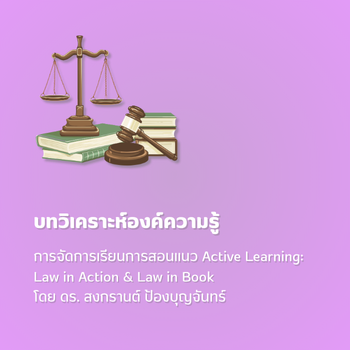ในยุคที่กฎหมายมีความซับซ้อนและเปลี่ยนแปลงอย่างรวดเร็ว การเป็นนักกฎหมายที่เก่งเพียงทฤษฎีในหนังสืออาจไม่เพียงพออีกต่อไป คณะนิติศาสตร์จึงมุ่งเน้นการพัฒนานักกฎหมายให้มีความเข้าใจเชิงลึกในทั้ง “กฎหมายในหนังสือ” (Law in Book) และ “กฎหมายในปฏิบัติการ” (Law in Action)
“กฎหมายในหนังสือ” คืออะไร? คือ กฎหมายที่ระบุไว้ในกฎหมายบัญญัติต่าง ๆ เช่น ประมวลกฎหมายแพ่งและพาณิชย์ ประมวลกฎหมายอาญา เป็นต้น
“กฎหมายในปฏิบัติการ” คืออะไร? คือ การนำกฎหมายในหนังสือไปใช้ในชีวิตจริง การตีความกฎหมาย การบังคับใช้กฎหมาย และการแก้ไขปัญหาทางกฎหมายที่เกิดขึ้นจริง
ทำไมต้องเรียนรู้ทั้งสองส่วน?
-
เพื่อเป็นนักกฎหมายที่รอบด้าน: ไม่เพียงแต่รู้กฎหมายทฤษฎี แต่ยังสามารถนำไปประยุกต์ใช้ในสถานการณ์จริงได้
-
เพื่อแก้ไขปัญหาทางกฎหมายได้อย่างมีประสิทธิภาพ: การเข้าใจทั้งกฎหมายในหนังสือและปฏิบัติการจะช่วยให้นักกฎหมายสามารถวิเคราะห์ปัญหาและหาทางออกได้อย่างรอบด้าน
-
เพื่อสร้างความยุติธรรม: การนำกฎหมายไปใช้จริงต้องคำนึงถึงความเป็นธรรมและผลกระทบต่อสังคม
การเรียนการสอนจะเน้นอะไรบ้าง?
-
การศึกษาคดีจริง: เพื่อให้นักศึกษาได้เห็นภาพการนำกฎหมายไปใช้ในชีวิตจริงในห้องเรียนหรือนอกห้องเรียน
-
การอภิปรายกลุ่ม: เพื่อให้นักศึกษาได้แลกเปลี่ยนความคิดเห็นและมุมมองที่แตกต่างกัน
-
การฝึกปฏิบัติ: เช่น การจำลองการพิจารณาคดี การทำโครงงานทางกฎหมาย
-
การเรียนรู้จากผู้เชี่ยวชาญ: เชิญผู้พิพากษา ทนายความ และผู้ปฏิบัติงานด้านกฎหมายมาให้ความรู้และแลกเปลี่ยนประสบการณ์
นักศึกษาควรเตรียมตัวอย่างไร?
-
เปิดใจรับฟัง: พร้อมที่จะเรียนรู้สิ่งใหม่ๆ และมุมมองที่แตกต่าง
-
ตั้งคำถาม: กล้าที่จะตั้งคำถามและแสดงความคิดเห็น
-
ฝึกการวิเคราะห์: ฝึกวิเคราะห์เหตุการณ์และข้อมูลต่าง ๆ ที่เกี่ยวข้องกับกฎหมาย
-
ติดตามข่าวสาร: ติดตามข่าวสารเกี่ยวกับคดีความและการเปลี่ยนแปลงของกฎหมาย
การเรียนรู้ทั้ง “กฎหมายในหนังสือ” และ “กฎหมายในปฏิบัติการ” จะเป็นจุดเริ่มต้นของการเป็นนักกฎหมายที่เก่งรอบด้านและมีส่วนร่วมในการสร้างสรรค์สังคมที่เป็นธรรม
In an era where laws are complex and volatile, being a bookish lawyer who is excellent in theory, but not in practice, may no longer be sufficient. Therefore, law schools focus on developing lawyers who have a deep understanding of both “Law in Books” and “Law in Action.”
What is “Law in Books”? It refers to the black-letter laws specified in various statutes, such as the Civil and Commercial Code, the Penal Code, and so on.
What is “Law in Action”? It refers to the application of the law in real life, the interpretation of laws, the enforcement of laws, and the resolution of actual legal issues.
Why is it necessary to learn both parts?
-
To be a well-rounded lawyer: not only to have the theoretical knowledge of laws, but also their practical applications in real-life situations.
-
To effectively solve legal problems: understanding both the law in books and practical applications will enable lawyers to analyze issues and find comprehensive solutions.
-
To promote justice: the application of law must consider fairness and its impact on society.
What will the teaching focus on?
-
Case Study: to allow students to see how the law is applied in real life, both in and out of the classroom.
-
Group Discussion: to enable students to exchange opinions and different perspectives.
-
Practical Training: such as simulating court trials and conducting legal projects.
-
Learning from Experts: inviting judges, lawyers, and legal practitioners to share knowledges and exchange experiences.
How should students prepare?
-
Be open-minded: be receptive to new things and different perspectives.
-
Ask questions: have the courage to ask questions and express opinions.
-
Practice critical thinking: train yourself to analyze events and information related to the law.
-
Stay informed: keep up with the news about legal cases and changes in the laws.
